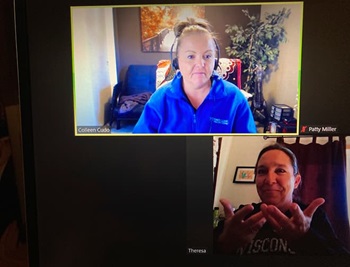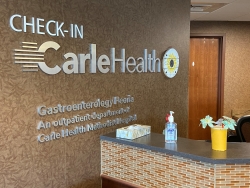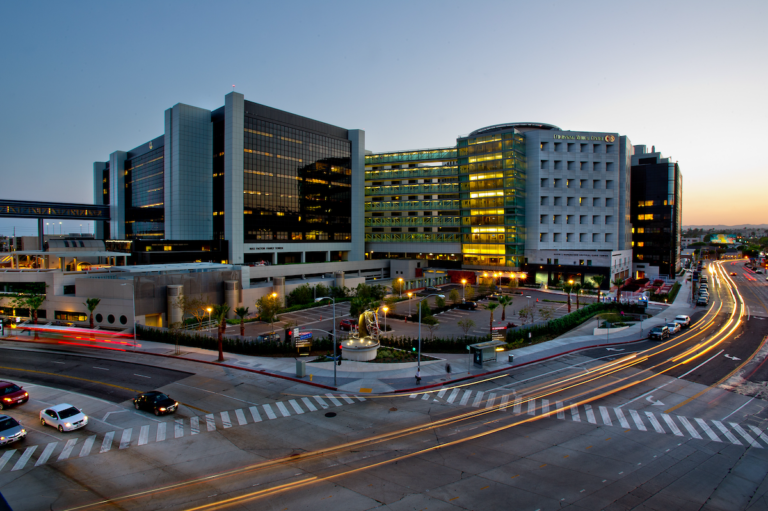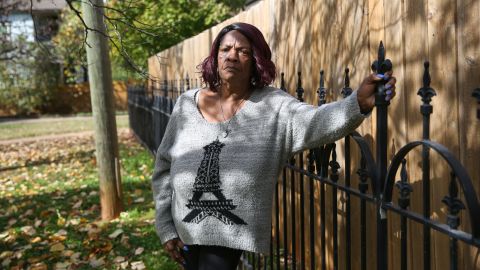
Atlanta, Georgia
CNN
—
A model of this story appeared in CNN’s Race Deconstructed publication. To get it in your inbox each week, join free right here.
For the previous 4 years, Angelina Alford was capable of stroll only a couple blocks to her neighborhood hospital every time she wanted emergency well being care.
Alford, 65, mentioned that she suffers from bronchial asthma, diabetes and hypertension, and that there have been occasions when the Atlanta Medical Middle’s (AMC) downtown hospital, previously generally known as Georgia Baptist Hospital, would maintain her in a single day for monitoring.
Nonetheless, with the closure of AMC’s downtown location final week – AMC South, the sister location in East Level, shut down in Might – Alford worries that touring to a different hospital in Atlanta visitors could possibly be a matter of life and dying. She doesn’t drive, she mentioned, and in consequence should depend on rideshare companies or members of the family to get round.
In accordance with the Atlanta Journal-Structure, the choice to shut the hospital got here as a shock to workers in addition to residents and metropolis leaders. The newspaper reported the pending closure on August 31.
“It’s irritating, and it’s unhappy,” Alford advised CNN. “And it provides me anxiousness, as a result of if I get sick, how am I going to get to the hospital?”
Wellstar Well being System, which operated each hospitals, insists that the closures had been resulting from shrinking income.
“Wellstar has operated AMC since 2016, investing greater than $350 million in capital enhancements and to assist sustained working losses. That features $107 million in losses in simply the final 12 months, amid reducing income and growing prices for workers and provides resulting from hovering inflation. The pandemic and the extraordinary monetary headwinds straining healthcare organizations proper now have solely made issues worse at AMC,” the nonprofit mentioned in an announcement.
However neighborhood advocates and well being coverage specialists say that the closures exemplify systemic inequality, and that the 2 AMC losses will disproportionately burden Black communities and low-income communities.
The closures aren’t distinctive. They’re a part of a a lot bigger sample of city hospital closures throughout the US. (Over the previous few many years, rural hospitals even have been disappearing.) Solely three years in the past, amenities in Chicago, Philadelphia and Washington, DC, shuttered. Residents within the surrounding poor, predominantly Black communities had been left reeling from the losses.

“We’ve had three hospital closures within the final 12 months or so, all of them Black neighborhoods,” David Ansell, the senior vice chairman for neighborhood well being fairness at Rush College Medical Middle in Chicago, advised Kaiser Well being Information in 2020, including that selecting to close down these hospitals was “actually prison” in his thoughts, “as a result of folks will die because of this.”
Very quickly in any respect, Grady Memorial Hospital, Atlanta’s solely remaining Stage I trauma heart, detected the results of AMC’s closure.
“We’ve already seen an inflow of sufferers in our emergency division and a rise in our trauma volumes. Nonetheless, we’ve got taken a number of steps to assist take up the elevated quantity. We’ve employed former Atlanta Medical Middle trauma surgeons and first care physicians to assist meet the rising want at our trauma heart and in our neighborhood well being facilities. Extra practitioners have been added to Grady’s Stroll-In Middle and our ER ready room. We’ve added 41 new inpatient beds, and extra are forthcoming,” Grady Well being mentioned in an announcement.
Georgia Republican Gov. Brian Kemp boosted funding to Grady Well being as a way to “permit Grady to soak up the influence from AMC’s closure and proceed offering high quality care to new and current sufferers.”
In an October open letter to neighborhood members, he mentioned that Grady Well being would obtain greater than $130 million in American Rescue Plan funds so as to add 185 beds to the hospital by the top of 2023.
Nancy Kane, an adjunct professor of administration on the Harvard College TH Chan Faculty of Public Well being, summarized the precarious state of entry to care in Atlanta and past the next manner.
“When a hospital leaves, the entire community begins to break down,” she advised CNN. “It’s not simply the trauma and maternity companies. The entire care continuum begins to be affected.”
Right here’s a more in-depth take a look at the persistent situation of city hospital closures:
Atlanta-area activists have fought for years to maintain city hospitals open, noting the hardships sure residents would face with out these amenities.
Richard Rose, the president of the NAACP’s Atlanta chapter, advised CNN that city hospital closures are a difficulty of “racial inequality.” State and hospital officers, he mentioned, have failed to supply the sources needed to avoid wasting the hospitals which have largely served town’s Black and low-income residents.
Certainly, the influence of the closures of AMC’s areas in downtown Atlanta and East Level (the 2 are round 7 miles aside) received’t be evenly distributed. Black residents and low-income residents will most acutely really feel the absence of those key suppliers of neighborhood care.
Atlanta – the so-called Black Mecca – is 49.8% Black, and East Level is 76.5% Black, in response to the latest knowledge from the US Census Bureau.
Per Wellstar figures cited by the Atlanta Journal-Structure, of the almost 4,300 emergency room sufferers the 2 AMC areas noticed in 2019, north of two-thirds (67.3%) had been Black, and greater than half (51.5%) had been Medicaid and Medicare recipients.
The closure of AMC downtown has left a gap locally.
There are a minimum of three main hospitals close by – Grady, Emory College Hospital Midtown and Piedmont Atlanta Hospital – however sufferers advised CNN about lengthy strains and overcrowding in these emergency rooms since AMC shuttered. Additional, some residents, comparable to Alford, lack transportation to get to the hospitals.
Equally, the closure of AMC South’s hospital and emergency heart has left quite a few households in south Fulton County – a cluster of suburbs with a mixture of poor, middle-class and upper-middle-class residents – with no full-service hospital lower than 7 miles away.
And whereas Google Maps estimates a 15-minute drive from AMC South to Grady, that commute could possibly be many leagues worse throughout peak visitors hours within the bustling metropolis.
Rose referred to Kemp’s pledge to fund extra beds at Grady as a “Band-Support repair on an open wound,” and defined that the closures jeopardize the well being of residents who stay close to shuttered amenities.
“In the event you get shot or have an accident or a coronary heart assault on the unsuitable time of day, it’s an actual drawback to get from southwest Atlanta to Grady Memorial Hospital in downtown Atlanta,” Rose mentioned. “It’s an pointless battle.”
Kane echoed a few of Rose’s sentiments, and painted a equally sobering image of entry to care within the aftermath of city hospital closures.
“The obvious consequence is that for those who’re in a low-income neighborhood, the space to care goes to be larger. And for those who don’t have a automotive, that distance is usually a huge situation,” she mentioned.
Kane added, “It’s been documented within the literature that in emergency circumstances – in case you have a coronary heart assault or a gunshot wound – particularly in a low-income neighborhood, you’ve gotten the next probability of dying, as a result of folks can’t get to the following hospital that simply.”
She additionally highlighted that, within the US, race and poverty are related to well being disparities, together with uneven entry to high-quality docs and care.
“Diabetes, stroke, hypertension: Many issues are prompted simply from poor health-care entry and low revenue and stress,” Kane mentioned. “The demand (for hospitals in communities of coloration and low-income communities) is larger than in different communities. So, it’s a double whammy: You’re sicker, and you’ve got worse entry.”
If the information about AMC appears acquainted, it’s as a result of the saga isn’t anomalous. Lately, city hospital closures have bothered many different components of the nation, too.
As an example, in August 2019, Westlake Hospital in Chicago filed for chapter, paving the best way to closure.
Simply two months prior, in June, Philadelphia’s Hahnemann College Hospital, which was the chief instructing hospital affiliated with the Drexel College School of Medication, introduced that it’d be shutting its doorways for good.
And in April of that 12 months, Windfall Hospital in Washington, DC, completely closed.
Westlake, Hahnemann and Windfall, very like AMC, largely served Black communities and low-income communities.
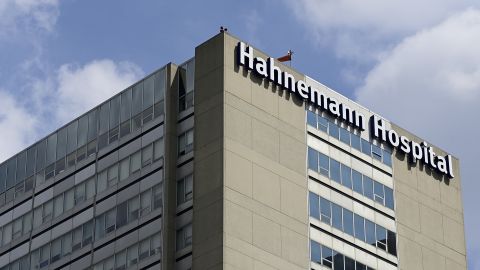
Alan Sager, a professor of well being coverage and administration on the Boston College Faculty of Public Well being who over the course of the previous 12 years has documented hospital closures in almost each main US metropolis, characterised the nation’s health-care system as “anarchic.”
“That phrase describes the forces at play: ‘Avoid wasting hospitals, shut others,’” he advised US Information & World Report in 2019.
Bonnie Castillo, the chief director of the union Nationwide Nurses United, expressed comparable sentiments.
“City hospital closures are extra apt to occur in racially segregated communities and particularly in African American neighborhoods,” she advised US Information & World Report.
Castillo underscored that the shutdowns’ results may be “devastating,” for the reason that residents of those communities depend on hospitals for major care (and different care) to a level that White and rich Individuals don’t.
When Windfall closed, emotions of misery permeated the encompassing neighborhoods.
“You’re hurting folks. You’re actually hurting folks. You’re messing with folks’s lives, and you’ll’t do this. You actually can’t do this,” as Phillip Lee, a lifelong DC resident, advised the CNN affiliate WUSA in 2019.
Usually, Kane questions claims that shutdowns happen as a result of hospitals are dropping cash.
“Declining income isn’t an occasion that comes from Mars. It comes from under-investment within the facility,” she defined. “That’s a part of the issue. It’s not that individuals say, ‘Let’s not go there anymore.’ It’s that they will’t get in or the companies they want aren’t there anymore or the constructing’s previous and they also select to go elsewhere.”
Put one other manner, income decline is an consequence.
“Services get years of neglect,” Kane added. “Then, the neglect will get to some extent the place you may’t keep the buildings, or the physicians say, ‘We’re not stepping into there anymore. The elevators don’t work.’ So many issues occur which can be unhealthy that firms say, ‘We’ve to shut the hospitals. Nobody desires to return right here anymore.’ Nicely, no kidding.”
Notably, city hospital closures shine a light-weight on the significance of native management over well being programs – on the devastation that may comply with when that authority atrophies.
“In the event you look broadly throughout the nation, there are huge chains buying hospitals. They may have greater than 100 hospitals. The headquarters is in St. Louis. The chains might need hospitals in 9 or 10 states. And the chains not have a way of dedication or loyalty to the area people,” Kane mentioned. “And so, for those who’re a hospital that has a number of Medicaid sufferers or a number of uninsured sufferers, or for those who’re a hospital that doesn’t get a lot authorities assist, you find yourself trying like a poor performer in a portfolio the place nobody is aware of what’s beneath.”
In brief, as a result of chains aren’t essentially acquainted with the neighborhood, they may not have a dedication to it, and state governments aren’t demanding that they listen.
Todd Greene, previously a member of Wellstar’s neighborhood board for AMC, can’t assist however fear concerning the latest closures.
He defined that they may additional chip away on the well being outcomes of Black residents, as a result of they relied on major and specialty care docs affiliated with shuttered hospitals.
Greene mentioned that a number of AMC medical places of work – together with household medication, neurosurgery and orthopedic practices – should both shut or relocate. And a few are transferring out of town altogether, to Whiter and wealthier Cobb County.
The consequence: Quite a few residents will battle to safe appointments, as a result of metro Atlanta doesn’t have a strong transit system that may get them to different counties.
Greene was forceful in his condemnation of firms and chains.
“They’re placing income over folks,” he advised CNN. “We already know that Black folks have a decrease life expectancy, and endure from power diseases (at the next charge). It’s going to be very tough for these folks to entry primary companies.”
